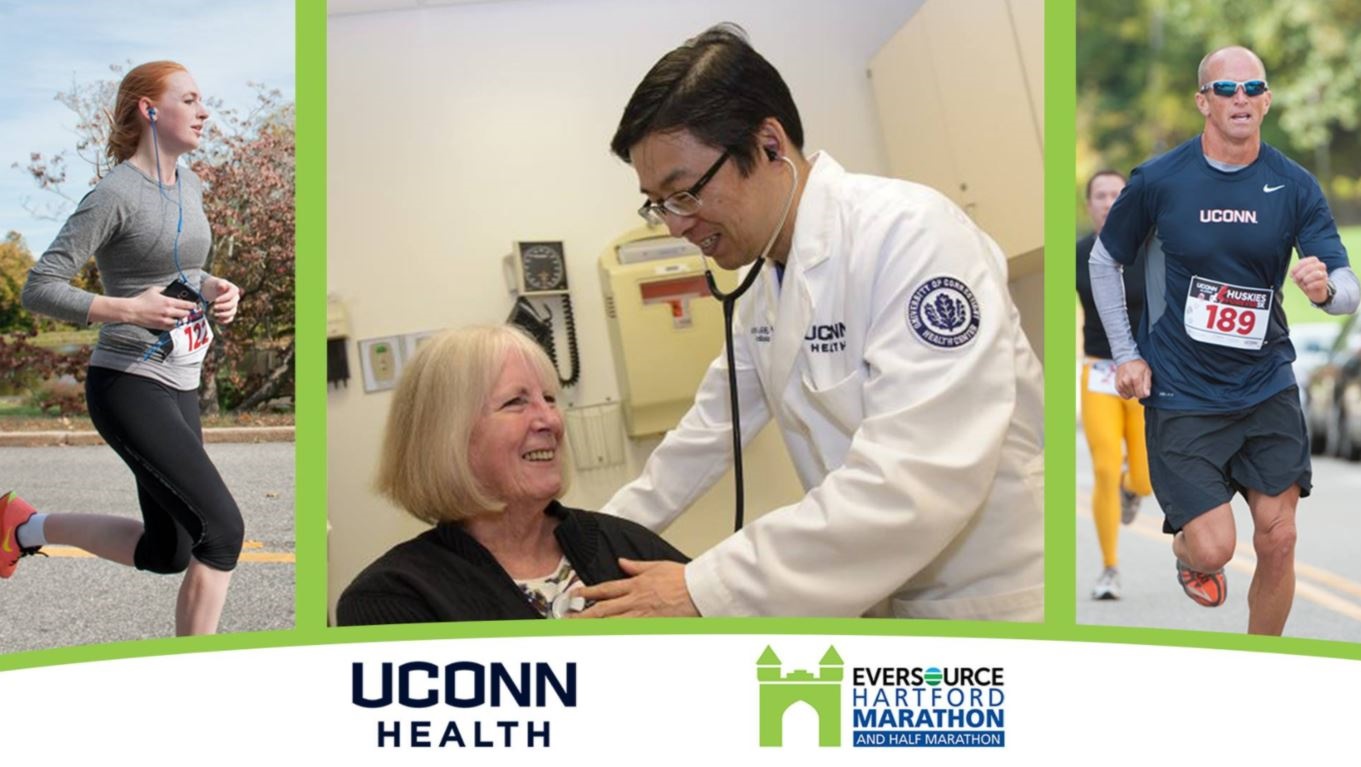If you’re running Connecticut’s biggest race on Oct. 14, or even its half marathon, 5k or team relay races, here are some key health and safety steps you should be taking now and keeping in mind for race day.
The UConn Foundation is a proud designated charity for this year’s Eversource Hartford Marathon. If you’re looking for a race team with a good cause, join the UConn Foundation’s team — all proceeds will benefit the Pat & Jim Calhoun Cardiology Center at UConn Health.
The top 10 Hartford Marathon health and safety tips from the UConn Health experts of Orthopedics & Sports Medicine and the Calhoun Cardiology Center include:
1. Start training early and progress slowly (and know your boundaries). A good general rule is no more than a 10 percent increase in mileage per week. Acute sports injuries can occur by doing too much, too soon. Be honest about the extent of your capabilities. Especially as you get older, your body may not be prepared to take on a race without pre-conditioning and slowly building up to a new level.
2. Stay hydrated. Drinking enough water daily is critical, especially as your body temperature climbs during your exercise training sessions and of course the big race. It is recommended to drink 10-18 oz. of water one-two hours prior to exercise. Limit coffee and other caffeinated drinks, which dehydrate the body.
3. Warm up and cool down. Perform about 15-20 minutes of simple warm-up exercise, like jogging, walking, or stretching, before and after training sessions and the big race. And don’t forget to drink water.
4. Fuel your body. In addition to lots of water, you should be maintaining a healthy daily diet low in fat and rich in color fruits and vegetables. A few days before race day you should be consuming more carbohydrates like pasta, not fats, to fuel your performance in the upcoming race. And a few hours before the race make sure to eat a carb-based breakfast.
5. Listen to your body aches.Appropriate early diagnosis of sports injuries is important. If you injure yourself or a notice change in your body’s function without a specific injury, and symptoms linger after two weeks of icing and over-the-counter anti-inflammatories, seek expert sports medicine care. If left untreated, symptoms, pain, and the injury itself could worsen. Also, during the race classic leg cramps are common especially if you are dehydrated. If a cramp strikes, stop and gently stretch and massage the cramped muscle. Sharp, sudden, extreme pain that does not feel like a typical cramp signals you to stop and signal for assistance from the course volunteers.
6. Monitor your heart rate. Wearing a fitness tracking device to safely monitor your heart rate as you train and during the race is a good idea. At rest, a normal heart rate is 60-100 beats per minute. With maximal exertion, a peak heart rate is 220 minus your age and during exercise, a safe heart rate ranges from 60-80 percent of your maximum heart rate. Some advanced athletes may have a lower heart rate at rest or exertion. To manually check your heart rate place both your index and third finger on your side of your neck to locate your pulse. Then count the number of beats you feel in 15 seconds and multiply by 4.
7. Recognize signs of heart attack. If you experience unusual shortness of breath, chest pain or pressure, arm or shoulder pain, or become lightheaded stop your physical activity immediately and seek medical attention by calling 9-1-1 or flagging a race volunteer.
8. Test your gear. Make sure you thoroughly test your light-weight running shoes and also socks to ensure they will be able to help carry you the length of the race and across the finish line (minus the blisters and sore feet). Also, wear breathable, comfortable clothing that won’t irritate your skin during the long race. On a chilly fall morning dressing in a hat and a top layer that you can discard during the race can keep your body warm at the starting line.
9. Get enough sleep. While you may be tempted to burn the candle at both ends to get in enough training exercise, it’s important to aim for 7-8 hours of sleep a night to allow your body to recover especially before race day.
10. Rest. A few days or a week before the race it is recommended to rest your body in preparation with no or limited exercise.



